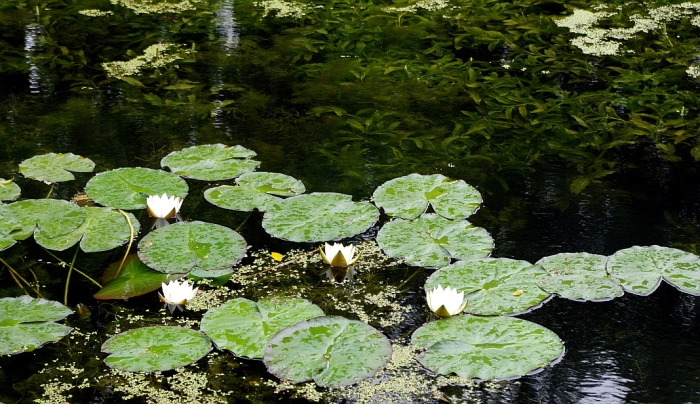Shining Pondweed
(Potamogeton lucens)
Shining Pondweed (Potamogeton lucens)
/
/

Георгий Виноградов (Georgy Vinogradov)
CC BY 4.0
Image By:
Георгий Виноградов (Georgy Vinogradov)
Recorded By:
Copyright:
CC BY 4.0
Copyright Notice:
Photo by: Георгий Виноградов (Georgy Vinogradov) | License Type: CC BY 4.0 | License URL: http://creativecommons.org/licenses/by/4.0/ | Rights Holder: Георгий Виноградов (Georgy Vinogradov) | Publisher: iNaturalist | Date Created: 2015-07-20T14:33:05-07:00 |

























Estimated Native Range
Summary
Potamogeton lucens, commonly known as Shining Pondweed, is an aquatic perennial herb native to a range of freshwater habitats in Eurasia and North Africa, including deep, still or slow-flowing waters with calcareous (chalky or limestone-rich) substrates. It can grow submerged in water up to 8 feet deep. The plant is characterized by its large, translucent, bright green leaves that have a glossy appearance and distinctive netted veining, which contributes to its common name. Shining Pondweed flowers from June to September, producing inconspicuous greenish-brown spikes that rise above the water surface. It is tetraploid with a chromosome count of 2n=52.
Shining Pondweed is valued in aquatic gardening for its ability to oxygenate water, provide shelter for aquatic wildlife, and its role in stabilizing sediments. It is often used in natural water bodies for these ecosystem services. In cultivation, it requires full sun to part shade conditions and thrives in calcareous, nutrient-rich waters. While it is generally low-maintenance, it can become invasive in some conditions, spreading rapidly and potentially outcompeting native species. Care should be taken to manage its growth in garden ponds and artificial water bodies to prevent it from becoming a nuisance.CC BY-SA 4.0
Shining Pondweed is valued in aquatic gardening for its ability to oxygenate water, provide shelter for aquatic wildlife, and its role in stabilizing sediments. It is often used in natural water bodies for these ecosystem services. In cultivation, it requires full sun to part shade conditions and thrives in calcareous, nutrient-rich waters. While it is generally low-maintenance, it can become invasive in some conditions, spreading rapidly and potentially outcompeting native species. Care should be taken to manage its growth in garden ponds and artificial water bodies to prevent it from becoming a nuisance.CC BY-SA 4.0
Plant Description
- Plant Type: Herb
- Height: 3-10 feet
- Width: 2-3 feet
- Growth Rate: Moderate
- Flower Color: Green
- Flowering Season: Summer
- Leaf Retention: Evergreen
Growth Requirements
- Sun: Full Sun, Part Shade
- Water: Aquatic
- Drainage: Standing
Common Uses
Low Maintenance, Water Garden
Natural Habitat
Freshwater habitats in Eurasia and North Africa, including deep, still or slow-flowing waters with calcareous substrates
Other Names
Common Names: Crystalwort
Scientific Names: , Potamogeton lucens, Buccaferrea lucida, Potamogeton acuminatus, Potamogeton americanus, Potamogeton angustifolius, Potamogeton caudatus, Potamogeton caudatus, Potamogeton coriaceus, Potamogeton corniculatus
GBIF Accepted Name: